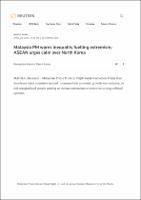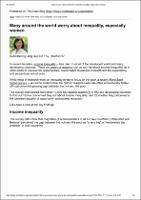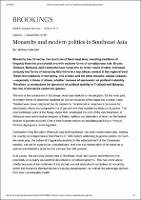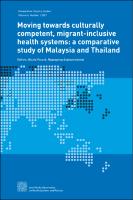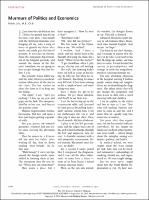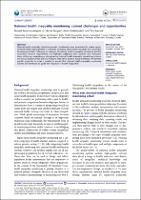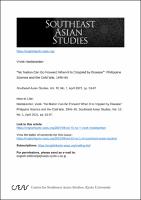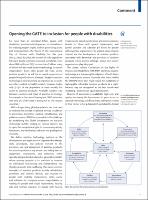Browsing by Title
Now showing items 178-197 of 299
-
Making free public healthcare attractive: optimizing health equity funds in Cambodia
(2018-06-25)
Background: Following the introduction of user fees in Cambodia, Health Equity Funds (HEF) were developed to enable poor people access to public health services by paying public health providers on their behalf, including non-medical costs for hospitalised beneficiaries (HEFB). The national scheme covers 3.1 million pre-identified HEFB. Uptake of benefits, however, has been mixed and a substantial proportion of poor people still initiate care at private facilities where they incur considerable out-of-pocket costs. We examine the benefits of ... -
Malaysia PM warns inequality fuelling extremism; ASEAN urges calm over North Korea
(Reuter, 2017-04-28) -
Many around the world worry about inequality, especially women
(World Bank Blog, 2017) -
Measuring health equity in the ASEAN region: conceptual framework and assessment of data availability
(2023-12-05)
Background: Existing research on health equity falls short of identifying a comprehensive set of indicators for measurement across health systems. Health systems in the ASEAN region, in particular, lack a standardised framework to assess health equity. This paper proposes a comprehensive framework to measure health equity in the ASEAN region and highlights current gaps in data availability according to its indicator components. Methods: A comprehensive literature review was undertaken to map out a core set of indicators to evaluate health ... -
Medical costs and out-of-pocket expenditures associated with multimorbidity in China: quantile regression analysis
(2021-02-25)
Objective: Multimorbidity is a growing challenge in low-income and middle-income countries. This study investigates the effects of multimorbidity on annual medical costs and the out-of-pocket expenditures (OOPEs) along the cost distribution. Methods: Data from the nationally representative China Health and Retirement Longitudinal Study (CHARLS 2015), including 10 592 participants aged ≥45 years and 15 physical and mental chronic diseases, were used for this nationally representative cross-sectional study. Quantile multivariable regressions ... -
Mental health literacy amongst children with common mental health problems and their parents in Java, Indonesia: a qualitative study
(2022-02-21)
Background: Optimising mental health literacy (MHL) at the individual and population level can be an effective mental health improvement and prevention tool. However, concepts of MHL are largely based on evidence from high-income countries. Little is known about the manifestation and role of MHL in countries where collectivist health and social cultures are dominant. Aim: This study aimed to examine the MHL of Indonesian children and young people (CYP) with experience of common mental health problems and their parents. Methods: Semi-structured ... -
Migrant Women’s Access to Sexual and Reproductive Health Services in Malaysia: A Qualitative Study
(2020-07-26)
Abstract Providing sexual and reproductive health (SRH) services to migrant workers is key to fulfilling sustainable developmental goals. This study aims to explore key informants’ views on the provision of SRH services for migrant women in Malaysia, exploring the provision of SRH education, contraception, abortion, antenatal and delivery, as well as the management of gender-based violence. In-depth interviews of 44 stakeholders were conducted from July 2018 to July 2019. Data were thematically analysed. Migrant workers that fall pregnant are ... -
Mitigating the impacts of the COVID-19 pandemic on vulnerable populations: Lessons for improving health and social equity
(2023-06-02)
The COVID-19 pandemic had an inequitable and disproportionate impact on vulnerable populations, reversing decades of progress toward healthy populations and poverty alleviation. This study examines various programmatic tools and policy measures used by governments to support vulnerable populations during the pandemic. A comparative case study of 15 countries representing all World Health Organization's regions offers a comprehensive picture of countries with varying income statuses, health system arrangements and COVID-19 public health measures. ... -
Monarchy and modern politics in Southeast Asia
(Brooking Institution, 2015) -
Moving towards culturally competent health systems for migrants? Applying systems thinking in a qualitative study in Malaysia and Thailand
(2020-04-06)
Cultural competency describes interventions that aim to improve accessibility and effectiveness of health services for people from ethnic minority backgrounds. Interventions include interpreter services, migrant peer educators and health worker training to provide culturally competent care. Very few studies have focussed on cultural competency for migrant service use in Low- and Middle-Income Countries (LMIC). Migrants and refugees in Thailand and Malaysia report difficulties in accessing health systems and discrimination by service providers. ... -
Moving towards culturally competent, migrant-inclusive health systems: a comparative study of Malaysia and Thailand
(the Asia Pacific Observatory on Health Systems and Policies, 2021)
Migrants are seldom included in policy discussions on the provision of health care, and in country policy reforms towards health for all. In addition, evidence on health care for migrant populations to inform and guide policy makers is limited. This Comparative Country Study (CCS) uses mixed-method approaches to analyse the extent to which two middle-income countries – Thailand and Malaysia, have culturally competent, migrant-inclusive health systems. The countries have taken different approaches to developing a migrant-inclusive health system. ... -
Murmurs of Politics and Economics
(New England Journal of Medicine, 2018-09-27) -
National health inequality monitoring: current challenges and opportunities
(Informa UK Limited, trading as Taylor & Francis Group, 2018-12-03)
National health inequality monitoring needs considerably more investment to realize equityoriented health improvements in countries, including advancement towards the Sustainable Development Goals. Following an overview of national health inequality monitoring and the associated resource requirements, we highlight challenges that countries may encounter when setting up, expanding or strengthening national health inequality monitoring systems, and discuss opportunities and key initiatives that aim to address these challenges. We provide specific ... -
“No Nation Can Go Forward When It Is Crippled by Disease”: Philippine Science and the Cold War, 1946–65
(Center for Southeast Asian Studies, Kyoto University, 2021)
This article outlines a notion of postcolonial Philippine science. First, it touches on the links between science, medicine, the Cold War, and nation building. Second, it examines the niche occupied by applied sciences, particularly nutrition, agriculture, and medicine, in nation building. Between 1946 and 1965, Philippine presidents understood science functionally, in terms of harnessing the country’s natural resources for economic development; and strategically, in terms of the Philippines being a regional leader of the free world in Southeast ... -
One Health Surveillance Highlights Circulation of Viruses with Zoonotic Potential in Bats, Pigs, and Humans in Viet Nam.
(2023-03-20)
A One Health cross-sectoral surveillance approach was implemented to screen biological samples from bats, pigs, and humans at high-risk interfaces for zoonotic viral spillover for five viral families with zoonotic potential in Viet Nam. Over 1600 animal and human samples from bat guano harvesting sites, natural bat roosts, and pig farming operations were tested for coronaviruses (CoVs), paramyxoviruses, influenza viruses, filoviruses and flaviviruses using consensus PCR assays. Human samples were also tested using immunoassays to detect antibodies ... -
Online qualitative research with vulnerable populations in the Philippines: Ethical and methodological challenges during COVID-19
(2023-10-06)
Our article draws on two multi-sited studies to present the ethical and methodological challenges of conducting online qualitative research among vulnerable populations in the Philippines—specifically, among people who use drugs—during the COVID-19 pandemic. While the global scholarship has long articulated the difficulties inherent to pursuing research on such populations, we show how the specific milieu of the Philippines in the last three years has created exceptional, structural challenges to the conduct of said research. Besides the inevitable ... -
Opening the GATE to inclusion for people with disabilities
(The Lancet, 2015)


